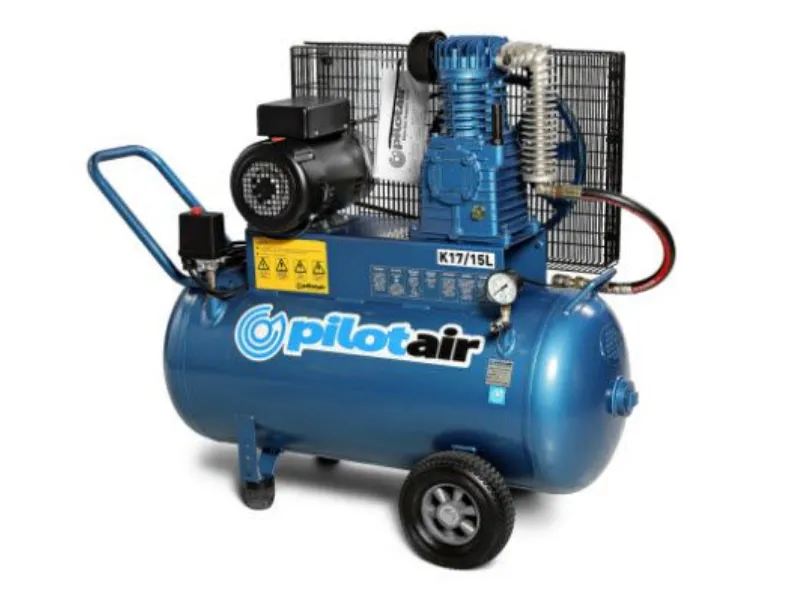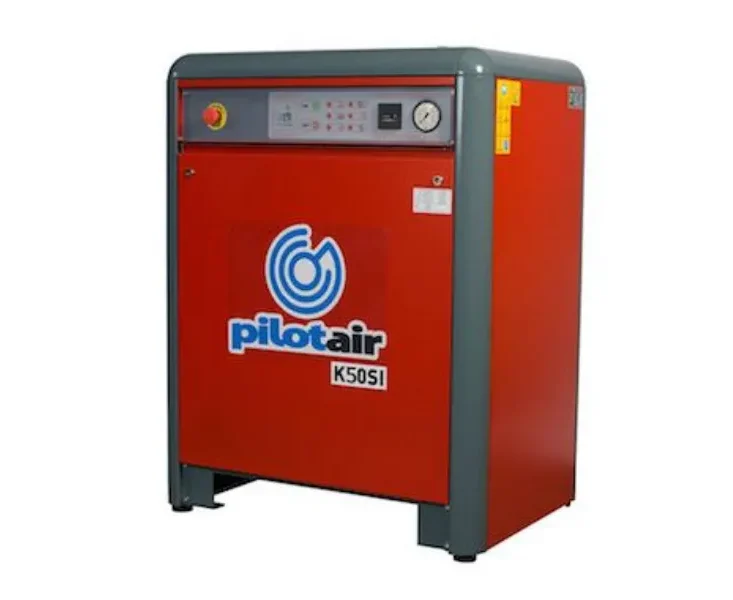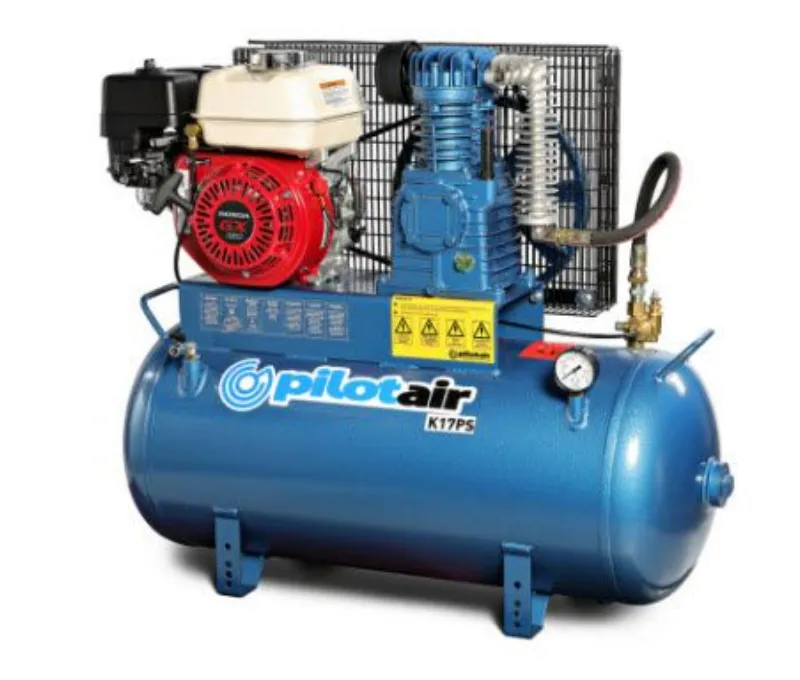Pilot Air’s extensive range of reciprocating air compressors is tailored for trade, professional or industrial applications.
Reciprocating Air Compressors

Why choose a reciprocating air compressor?
Reciprocating air compressors have been in use for decades. They rely on a piston moving back and forth in a cylinder to compress air, a proven design known for its reliability.
A key reason to choose a reciprocating compressor is the lower initial cost and simplicity of maintenance. These piston compressors are very effective for intermittent tasks or short-duty cycles; they deliver quick bursts of high-pressure air without running nonstop. Reciprocating units are popular in smaller workshops, construction sites, and DIY projects. Their robust construction and straightforward design make them dependable when you value proven technology and ease of use.

Petrol, diesel, 3-phase & 240V
Pilot Air’s range of reciprocating compressors comes in petrol or diesel engines, as well as electric units running on either 240V single-phase or three-phase power. This flexibility means a reciprocating compressor can go anywhere needed: petrol and diesel models are perfect for mobile job sites and remote locations without mains electricity, offering on-demand air in the field. Meanwhile, the electric versions cater to workshops and factories. 240V units plug into standard outlets for trades and small businesses, while three-phase models deliver higher output for heavy industrial applications. By providing options across these power sources, Pilot Air reciprocating compressors ensure you can choose a unit that aligns with your available power supply and work environment.

Value for money
For buyers focused on value, reciprocating compressors are an attractive choice. They typically cost much less upfront than rotary screw units of similar capacity, allowing even small businesses to get the air power they need without breaking the budget. Maintenance over the life of the machine is also economical. Piston compressors have simpler components and don’t require specialised servicing, which keeps upkeep costs low.
If your air usage is intermittent, you’ll save on energy too by running the compressor only when needed, rather than paying for a continuous-duty system. Overall, a reciprocating air compressor delivers reliable performance at a fraction of the investment, making it a high-value solution for many workshops and job sites.

What to consider when choosing a reciprocating air compressor
Choosing the right reciprocating compressor means evaluating your specific needs. First, consider your usage pattern: these compressors excel at intermittent duty rather than continuous 24/7 operation. Think about power source availability. Choose among petrol, diesel, or electric single-phase 240V vs three-phase, based on your power on site. Also check key specs such as free air delivery, airflow, tank volume, motor power, and max pressure to be sure the unit meets your tools’ demands. Noise is another factor: if the compressor will operate near work areas or in noise-sensitive sites, a low-noise “silent” model could be beneficial. Always opt for a reputable manufacturer with local maintenance and spare parts support like Pilot Air.
Frequently Asked Questions
What is a reciprocating air compressor, and how does it work?
A reciprocating air compressor uses a piston and cylinder system to compress air. As the piston moves back and forth, it draws in ambient air and compresses it into a storage tank, where it’s available at high pressure for tools and equipment. This time-tested technology is known for its durability, efficiency, and ability to deliver short bursts of high-pressure air when needed.
When is a reciprocating air compressor the best choice?
Reciprocating compressors are ideal for applications with intermittent air demand, such as workshops, construction sites, and service vehicles. They’re well-suited for jobs requiring high pressure but not a continuous air supply, making them a cost-effective and dependable choice for trades, maintenance crews, and small manufacturing operations.
What power options are available for reciprocating compressors?
Pilot Air offers reciprocating compressors powered by petrol, diesel, or electricity. Electric models are available in both 240V single-phase for light industrial or domestic use, and three-phase for higher-demand applications. Petrol and diesel versions are perfect for remote or mobile worksites where mains power isn’t available, providing flexibility across industries.
Why are reciprocating compressors considered good value for money?
Reciprocating compressors provide excellent value with lower upfront costs and minimal maintenance requirements. Their simple mechanical design means fewer specialised service needs and lower overall running costs. They also help reduce energy consumption when used for intermittent-duty tasks, making them a smart long-term investment.
What factors should I consider when selecting a reciprocating air compressor?
Key considerations include your required air volume (free air delivery), maximum pressure, tank size, power supply, and duty cycle. It’s also worth factoring in noise levels and installation space. Selecting a compressor that matches your specific tools and work environment will ensure optimal performance and efficiency.
How does Pilot Air stand out in reciprocating air compressors?
Pilot Air has been a trusted Australian air compressor specialist for over 40 years. Our reciprocating compressors are engineered for reliability and built to perform in harsh local conditions. With comprehensive after-sales support, spare parts availability, and expert technical advice, Pilot Air delivers confidence and long-term value to every customer.
Are Pilot Air compressors supported locally?
Yes. Pilot Air provides national support through its Australian-based service network. Customers benefit from local spare parts, technical expertise, and maintenance assistance—ensuring fast turnaround times and minimal downtime. This commitment to service sets Pilot Air apart from imported brands with limited local backing.
What maintenance does a reciprocating air compressor require?
Regular maintenance includes checking and replacing filters, draining condensation from the tank, inspecting belts and valves, and ensuring correct oil levels in lubricated models. Following Pilot Air’s maintenance recommendations helps extend equipment life, improve efficiency, and ensure consistent compressed air performance.
Pilot Air Reviews
We have a growing manufacturing business and our air supply needed to be upgraded to deliver to a clean volume of air to specific machines and mainly our spray booth. 3 Months ago the team at Pilot Air evaluated our requirement and delivered an excellent solution, we have had time to run the system for a considerable time and found it to be excellent. Also Australian Manufactured to boot. Very Happy.
Brett
My husband recently bought a second hand Trademaster 12 air compressor in need of some maintenance. He took it to the Silverwater servicing centre with no prior arrangement. The staff were polite, obliging, and eager to help, and he was impressed with the service provided. Well done Pilot Air!
Donna Slater
I would just like to thank Debbie and the team at Pilot Air Compressors Service Department for a great job done this morning.
Excellent job done, Great Staff & Great Service
Thank you Debbie & the team at Pilot Air Compressors…
Geoff Bryce
Bryce Pest Control Pty Ltd.
Geoff Bryce
Thanks Pilot Air! We have just purchased our third pilot compressor (K50). Our oldest one (K25) is 14 years old and still going strong, used all day every day only replaced pressure switch.






